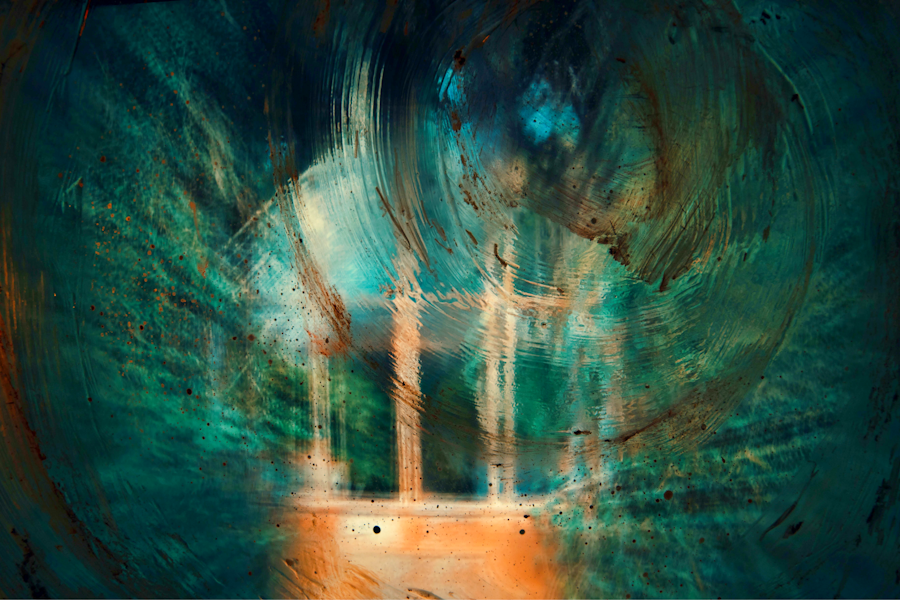Introductory Note:
You might not be familiar with the term “triduum.” The Paschal Triduum refers to the three holy days of liturgy and prayer culminating on Easter Sunday. To help us enter Triduum, minister and spiritual director Drew Dixon (one of the pastors attending Renovaré’s Pastors Retreat later this month, and a coordinator companion with Renovaré’s Fellowship of the Burning Heart) offers a collection of scripture readings, reflections, and prayers for each of the three days.
Renovaré Team
Good Friday
OT: Isaiah 52:13-53:12 Psalm: Psalm 22 NT: Hebrews 4:14-16; 5:7-9 Gospel: John 18-19
You died today. You really died. Your heart stopped. Your lungs emptied. Your spirit left your body.
Good Friday has always been a solemn day to me. I tread through this day as through a cemetery: with light steps and a heavy heart. There is a certain amount of reverence, fear, awe, and respect that has always captured me about this day. Mostly on this day, I want to pause and reflect. I want to feel. So much could be said, but I want to remain silent. Yet, I am writing, so I will share a few words:
No One Is Good But God
Why do we call this day “Good Friday”? What is good about the suffering and death of an innocent man? Of course, we might selfishly say that it is good for us because on this day our salvation was purchased. Yet surely this is an insensitive posture with which to approach this day! Some have said this day is called Good Friday using the word “good” in the sense of a good, high, and holy day: a day set apart. That may be a proper etymology. Others have suggested that Good Friday was originally God Friday, but then became popularized with the word good instead of God. That would not be surprising, especially when considering our cultural tendency to flatten out holy things.
As I think of “Good Friday,” I am reminded of a passing comment that Jesus made once when answering a question:
As Jesus started on his way, a man ran up to him and fell on his knees before him. “Good teacher,” he asked, “what must I do to inherit eternal life?”
“Why do you call me good?” Jesus answered. “No one is good — except God alone. (Mark 10:17 – 18)
There is much to be debated and wondered at from this fleeting interaction. Was Jesus denying his divinity? Or was he asserting it? Perhaps we can ask the same question in the context of “Good Friday” rather than “Good Teacher.” We could rephrase Jesus’ question this way: “Why do we call this Good Friday? No day is good, except for God’s day?” Well, is this day good or not? Is this God’s day or not?
No Day Is Good But God’s
Of course not! We may assume. This is the day that evil triumphed. It is the day that injustice won out. Innocence was swallowed up by sin; humility was stamped down by pride. And it would be natural to assert and assume such. But what do today’s lectionary readings tell us? “We thought his affliction and torment was the abandonment of God, when all the while it was God’s rescue plan!” (Isaiah 53:4 – 5) or “When someone is facing affliction, it is not because God has abandoned him!” (Psalm 22:24) What do we learn from these? That today is not the triumph of injustice, but precisely the opposite.
Today is in fact God’s day because it is this day that God did what only God could do. It is the day that Jesus, in the words of N.T. Wright, “took upon himself the Accuser’s sharpest arrow and, dying under its force, robbed the Accuser of any further real power” (Simply Jesus, 188). It is this day that the devil was disarmed. God, in Jesus, took on what only he could take on: Death itself!
But let’s not get ahead of ourselves. The devil may have been disarmed, but he is not yet defeated. Death still stings. Disciples are still scattered. We are still in disarray.
We veil our faces before your glory,
O Holy and Immortal one,
and bow before the cross of your wounded Christ.
with angels and archangels,
we praise you, our Mercy,
and we bless you, our Compassion,
for in our brokenness
you have not abandoned us.
Hear us as we pray through Jesus, our high priest:
heal all division,
reconcile the estranged,
console the suffering,
and raise up to new life
all that is bound by death. Amen.
(Revised Common Lectionary Prayers)
Holy Saturday
OT: Job 14:1-14 Psalm: Psalm 31 NT: 1 Peter 4:1-8 Gospel: Matthew 27:57-66
Matthew’s account of Jesus’ burial includes a detail that none of the other gospels share:
The chief priests and the Pharisees went to Pilate. “Sir,” they said, “we remember that while he was still alive that deceiver said, ‘After three days I will rise again.’ So give the order for the tomb to be made secure until the third day. Otherwise, his disciples may come and steal the body and tell the people that he has been raised from the dead. This last deception will be worse than the first.”
“Take a guard,” Pilate answered. “Go, make the tomb as secure as you know how.” So they went and made the tomb secure by putting a seal on the stone and posting the guard. (Matthew 27:62 – 66)
Sometimes we do what the disciples did. The priests and Pharisees remembered the promise of resurrection and requested a guard while the disciples forgot the promise and fled. Both acted out of fear. Sometimes fear gets the best of us too and snuffs out our hope of resurrection. May our fear be met with faith so that, in times of distress and doubt, we might remain faithful to our Lord and to his promises.
Sometimes we do what the Pharisees feared. The Pharisees requested the presence of a guard because they feared the disciples would come to steal the body of Jesus and falsely claim his resurrection. Had the disciples done this, the Pharisees would have been right, “The last deception would be worse than the first.” False resurrection is a dark deception, indeed. Yet, sometimes we do this very thing. Sometimes we blindly walk into dark situations with shallow words of encouragement and false words of hope. Not that encouragement is wrong or that our hope is false, but we often rush too quickly from Friday to Sunday and forget the Saturday in between — the day of mourning, doubting, waiting.
Our worship services often miss a vital element of the human experience: lament, grief, and mourning. It is true that we are not to grieve as those without hope, yet we must still grieve! That is today. Holy Saturday. We would do well today to remember these words:
Mourn with those who mourn. (Romans 12:15) Blessed are those who mourn, for they will be comforted. (Matthew 5:4)
It is okay to mourn. It is okay to weep. Let yourself feel the weight of it all. We need not force a false resurrection, but only wait for and trust in the true one. Sunday will come. But today is Saturday. On Sunday we will rejoice with those who rejoice but today let us mourn with the ones who are mourning.
Christ our God,
your love is poured out in death for our sakes.
Hold us in your embrace
as we wait for Easter’s dawn.
Comfort us with the promise that no power on earth, not even death itself,
can separate us from your love;
and strengthen us to wait
until you are revealed to us
in all your risen glory. Amen.
(Revised Common Lectionary Prayers)
Easter Sunday
Psalm: Psalm 118 Reading 1: Acts 10:34-43 Reading 2: Colossians 3:1-4 Gospel: John 20:1-18
God tells the most surprising stories.
On Saturday we were lost in darkness and doubt. We paused to feel the weight of all the pain and sorrow. We mourned with those who mourn. We were caught in a moment of eclipse under a great shadow. But today, we pause to glimpse the other moments. The moments of life and light; of truth and joy. After all, an eclipse can only occur when there is a sun. In the words of the Switchfoot song, “The shadow proves the sunshine.”
But that cliché is only possible because of God. We know that darkness can exist without light. Space is just a vacuum. We can all read the opening lines of our bible and see that in the beginning there was only darkness. And this is where God begins telling his surprising story.
God said, “Let there be light,” and there was light.
What was that moment like? The first-ever eruption of light — an interruption of darkness. From that moment, the duality of light and darkness came to be. And the light has persisted. In fact, our hope is that the light will eventually burn out the darkness.
What was that moment like? Probably not unlike the moment we celebrate on Easter. When Mary came to the tomb “while it was still dark” only to find it empty. The first-ever resurrection — an interruption of death. From that moment, life has spread through the earth. And life has persisted. Our hope is that this life will stretch out beyond death.
God’s stories are surprising because they are not what we’re used to. His story runs contrary to our experience. Extinguished flames don’t reignite. Overturned places don’t rebuild themselves. Barren and virgin wombs don’t bring forth life. Enslaved and marginalized people are not glorified. Death doesn’t lead to resurrection. Or does it?
What I learn in this season of Easter is how the resurrection of Jesus invites us to see the world in an entirely new way! In the resurrection, God invites us and beckons us to imagine a world where life does stem from death; where light does come out of darkness.
So, “if you have been raised with Christ, seek the things that are above, where Christ is, seated at the right hand of God.” (Colossians 3:1) This doesn’t mean that we ought to be some far-off, other-worldly people. It means that we should re-imagine the world according to the resurrection! Don’t think like death anymore; think like life! Dream of the possibilities of life and resurrection. And while it’s still true that overturned homes don’t rebuild themselves, as God’s people we can be the ones to hold onto hope and rebuild. Let us be that people. People of the resurrection, bringing the world back to life.
O God of glory,
in the Easter dawn
you raised Jesus from death to life.
As we are united with him in death,
so unite us with him in resurrection,
that we may walk in newness of life
and re-imagine the world as you have made it. Amen.
(adapted from Revised Common Lectionary Prayers)


